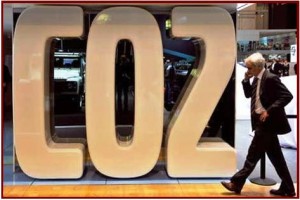The Carbon Disclosure Project released today an analysis showing that S&P 500 companies are making progress towards reducing carbon emissions when compared to the so-called Global 500 that operate in countries with more stringent greenhouse gas regulations. CDP claims the results show a “tipping point” has been reached at top levels of corporate management to integrate a so called “sustainability agenda” into overall business strategy.
This apparent acknowledgement of the growing spending and voting power of the green movement is occurring without comprehensive regulatory requirements in the U.S. to reduce CO2, and despite the wish – sometimes actually stated publicly this election season – of Republican party candidates to abolish the Environmental Protection Agency and ignore climate change and thwart possible remedial actions.
This CDP S&P 500 Climate Change Report was prepared for 655 institutional investors representing $78 trillion in assets, which is probably why CEO’s are waking up since the stock price of their firms and their multimillion dollar bonuses are potentially at stake – the free market bites back. The report provides an annual update on the publicly stated greenhouse gas emissions data and climate change strategies at America’s largest public corporations. What is going on behind the scenes with money-ridden industry lobbying efforts in “pay to play” Washington is of course undocumented, and might be intended to actually have the opposite effect on cleansing the environment.
Nevertheless, the average disclosure score as calculated by CDP to reflect each company’s transparency on climate change, has increased by 13%. The disclosure score required by companies to achieve a position in the so-called Carbon Disclosure Leadership Index (CDLI) has increased by 11% to 92. This is now roughly equal to a minimum score of 94 required for a position on the Global 500 CDLI1. It shows, claims CDP, that the quality of corporate reporting in the United States continues to improve.
Globally, according to the CDP Global 500 Climate Change Report, also released today, this year has seen a 10% increase year-on-year in companies integrating climate change into their business strategies (compared to 2012 at 78%, 2011: 68%), contributing to a 13.8% reduction in reported corporate greenhouse gas emissions from 3.6 billion metric tons in 2009 to 3.1 billion metric tons in 2012. The decrease is said to be equivalent to closing 227 gas-fired power stations or taking 138 million cars off the road. One third of companies (31%) however reported no emissions reductions. Not one U.S. automaker made the top ten list of either report.
CDP claims that after increasing incidents of extreme weather, which disrupted business operations and supply chains around the world, climate change is now on boardroom agendas. With the hottest US summer on record, fires in Russia and flooding in the UK, Japan and Thailand, among other events, 81% of reporting companies now identify physical risk from climate change, with 37% perceiving these risks as a real and present danger, up from 10% in 2010.
See:


